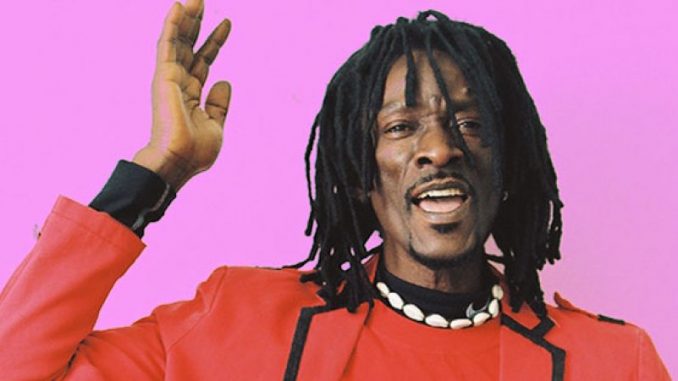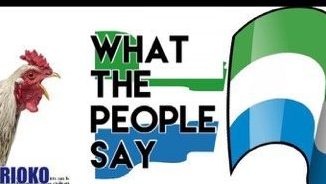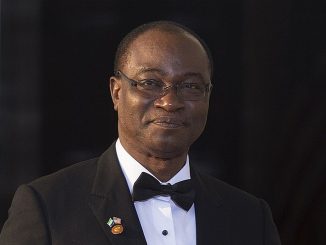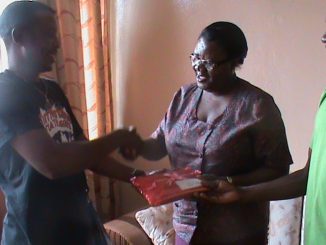
Obituary: Ahmed Janka Nabay (January 5, 1964 – April 2, 2018)
We are shocked and incredibly saddened to announce the sudden death of Ahmed Janka Nabay. He died unexpectedly in the Kambia District of northwestern Sierra Leone on Monday, April 2, following a sudden stomach illness. His body was transported to Freetown on Monday evening for funeral services on Wednesday, April 4. His death was confirmed by his longtime friend, journalist Wills Glasspiegel, and his bandmates of 8 years, Boshra AlSaadi and Michael Gallope, who have been in touch with his family in Sierra Leone.
 To those of us who knew and worked with him, Janka was a true force, a man of exceptional charisma and talent, and a shining ray of light, who will be missed dearly by friends all around the world. We remember him above all for his sense of humor, his energy, his astonishing creativity, his smile, and his charm, which touched many of those he met.
To those of us who knew and worked with him, Janka was a true force, a man of exceptional charisma and talent, and a shining ray of light, who will be missed dearly by friends all around the world. We remember him above all for his sense of humor, his energy, his astonishing creativity, his smile, and his charm, which touched many of those he met.
Ahmed Janka Nabay, also know as the Bubu King, was born on January 5, 1964 in the village of Sedu, in Eastern Sierra Leone. The fourth in a family of five children, his mother was Temne and his father, a diamond miner and fish seller, was of both Mandingo and Temne heritage. Janka is survived by three children: Sia Precious Kemoh and Zachariah Osman Nabay, both of Freetown, Sierra Leone; Ahmed Nabay of Kuwait City, Kuwait; their mother Rugiatu Marvelous Nabay of Freetown; his loving wife, Kadiatu Nabay of Rokel, Sierra Leone; as well as many other loving friends and family.
Janka was a pioneering popularizer and modernizer of traditional Sierra Leonean bubu music, a genre that he first heard while visiting Masimo with his grandmother as a child. Originating from the Temne people in northern and western Sierra Leone, in its traditional form, bubu music is played by an ensemble blowing alternating, hypnotic rhythms on bamboo horns. In Sierra Leone, bubu music is an ancient and celebratory style of music that has been used to accompany a variety of holidays across Sierra Leonean history, from Ramadan processionals to New Year’s Day celebrations.
Janka’s modernization of bubu music made him into an icon of Sierra Leonean culture. Over his lifetime he released seven cassettes, two EPs, and two full length albums of electrified bubu music that fused together traditional rhythms and sounds, to considerable, and increasingly international, critical acclaim. Janka’s bubu was ancient and modern at the same time; it made use of traditional melodies and rhythms, but reworked them with modern digital recording, keyboards, casio synthesizers, and loops. It was powerful and entrancing dance music, but never conformed to easy fantasies of “global grooves.” During performances in the U.S., Janka surprised audiences by describing scenes of civil war, social ills, and political struggles in between songs. His lyrics reflected his persistent struggles as an immigrant without legal status, stuck in between nations, cultures, laws, and means of support in contexts where he never felt fully at home. In his music, outright celebration and ecstasy are often fused with undercurrents of fear and powerfully voiced dissent.
As a child in Sierra Leone, Janka grew up loving to sing with his family, and often found himself joining his siblings and cousins to “sing for his supper.” Born in the provinces, he moved at the age of five to the city of Makeni where his life as an artist began. During a concert by the highlife musician Prince Nico Mbarga, Janka found his first taste of fame when he was pulled on stage by the singer for an impromptu performance for Mbarga’s hit “Sweet Mother.”
Later, as a teenager, Janka moved to Freetown. Always interested in politics, at 16, he began composing his own songs about pan-Africanism and Nelson Mandela. Janka’s musical career first took off during his early 20s after an audition for Super Sound, a newly formed record label and studio that had relocated from war-torn Liberia. Super Sound producers were on the lookout for local musicians, but wondered aloud why all the auditioners had chosen to perform reggae, while none sang any uniquely Sierra Leonean music. For Janka’s audition, he tried a different tack, performing a vocal rendition of a bubu song. Audiences were impressed, and opportunities in Freetown soon followed. Following the audition, Janka released a string of cassettes featuring modernized bubu music on keyboards and synthesizers. Stemming from the success of his Freetown releases, in the coming years, Janka would become a bona fide Sierra Leonean pop star and cultural ambassador. He conferred with United Nations representatives and filled performance venues in Freetown, performing hits like “Dance to the Bubu,” “Lek U Culture,” and “Sabanoh.”
Sierra Leone’s political struggles were always a part of Janka’s music and life. In the mid 90s, at the heights of the country’s decade-long civil war, Janka risked his life by using his music to criticize both the rebels and the government. At the same time, rebel troops played his music from boomboxes, luring people into the open and then conscripting them, or worse. Later, the infamous rebel general Sam Bockarie, known as “General Mosquito,” took in Janka and his 11 piece band, and forced them to perform for the rebels. As recounted to the The Village Voice, Janka finally approached the general after 17 days and several performances in the camp, declaring in protest: ”I’m tired, I have to go.” The general responded, “OK, Janka, you can go,” and went out with his pistol and shot it in the air, finally declaring: “Nobody gets any boats until Janka Nabay and the Bubu Gang can get back to Freetown!” Traumatized by the conflict and fearing for his life, he ultimately fled Sierra Leone via Guinea, and by 2002 made his way to the United States with the help of a P3 Artist Visa. For years, little luck came his way; he worked in poverty up and down the east coast, supporting himself selling CD-Rs of his music, and working in fast food restaurants, food trucks, and washing garbage trucks.
In 2010, radio producer Wills Glasspiegel had heard Janka’s bubu music and sought him out in the Bronx. He lent his support to Janka, and helped him find a crowd of celebrated Brooklyn musicians who frequented the local Brooklyn club Zebulon, and who ultimately joined him as collaborators: Boshra AlSaadi (vocals), Michael Gallope (keyboards), Jonathan Leland (drums), Jason McMahon (bass), Doug Shaw (guitar), and Daniel Schlett (production). That year, Janka released his first record in the states—the Bubu King EP on True Panther Sounds, which features four songs from his Freetown catalog. He then joined forces with his collaborators to record En Yay Sah, an acclaimed debut album in the U.S. The album was released by Luaka Bop in 2012 to praise from Pitchfork, Vice, NPR and The Washington Post, the latter two naming it among the best albums of that year. With his American Bubu Gang, Janka toured the states repeatedly, performing at the P.S.1 Warm-Up, the Museum of Modern Art’s sculpture garden, The Getty Center, Celebrate Brooklyn, Bonnaroo, and the Chicago World Music Festival. In 2017, Janka released his second full-length album with Luaka Bop, Build Music, and embarked on his first ever European tour to much acclaim at major festivals such as Roskilde (Denmark), Lowlands (Netherlands), OFF (Poland), Øya Festival (Norway), Milhões de Festa (Portugal), and Sinsal Audio (Spain).
Having reestablished his career in the West, Janka had hoped to stay in the U.S., but after many years spent waiting on an ultimately unsuccessful green card application, he decided to move home to Sierra Leone. Since he returned from his first European tour in September 2017, he had been living there with his wife, Kadiatu Nabay. In recent months, Janka was at work on his third full-length album in a collaboration with the up and coming Sierra Leonean producer, Lanzo On D Beat, before his life was tragically cut short. He had plans to complete, with Lanzo, a third album for Luaka Bop, with the hopes of future international touring with his Bubu Gang. While the third album is currently incomplete, upon the news of Nabay’s death, Lanzo wrote this song from his studio in Freetown, “RIP Janka Nabay.”
Janka Nabay’s name will be remembered as one of Sierra Leone’s great artists and cultural pioneers. Janka once recalled:
“My father always told us he won’t die with money, but he has some diamonds, and we are the diamonds. I’m a diamond! I’m telling you! Trust me. Everybody knows Janka is a diamond, yes.”
Amid many serious economic and personal struggles, Janka certainly carried his value within. He carried it in the way he talked, sang, dressed, walked, danced, posed, played soccer, teased, smoked, philosophized, theologized, joked, debated, told stories—in the innumerable experiences many of our friends and family have shared since his passing. Since the 1990’s, Janka has been joined by over 35 different musicians in various combinations, many hailing from all over the world. He showed that one man was capable of living through civil war to pass on a massive cultural heritage and legacy to artists and audiences globally. There are many people out there like ourselves who loved Janka and his music, and who supported him in one way or another over the years. We are forever grateful for your support, and we know he is as well.
A memorial service and gathering will be announced on his facebook page. A support fund for his family has been set-up, here.
Thanks for everything you gave us Janka. We will always miss and love you.
May you rest in peace.
With much love,
Luaka Bop
Written by Boshra, Michael, Wills, Eric, Paul & Yale



